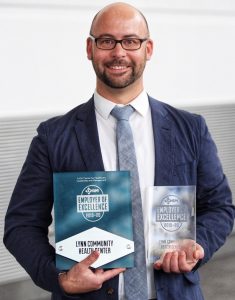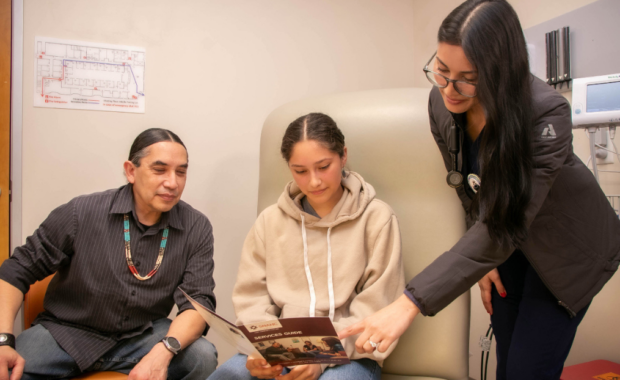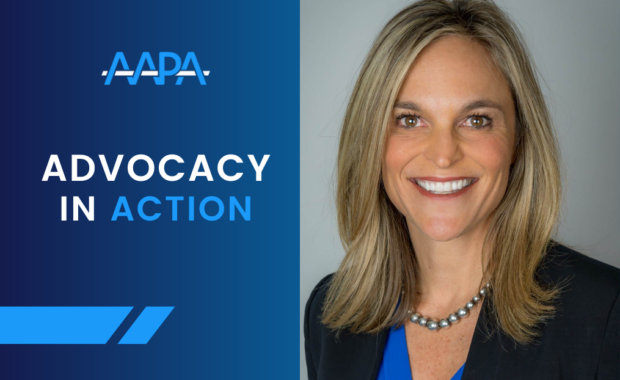This PA Telemedicine Director Thinks You Should Explore a Career in Virtual Medicine
Lots of Potential for PA Careers in Growing Niche Area
August 8, 2019

A unique organization among the 2019-2020 CHLM Employer of Excellence winners is Lynn Community Health Center (LCHC) in Lynn, Massachusetts. LCHC was nominated by PA Brian Headley, who serves as its Telemedicine Director. Headley talked to AAPA about his role at LCHC, where more than 90% of the health center’s patients live at or below 200% of the federal poverty level, and more than 50% are best served in a language other than English.
Q: Telemedicine director is not a common job title for PAs. Can you tell us what your job entails at Lynn Community Health Center?
LCHC is a clinic which serves approximately 40,000 patients in Lynn.. Our clinic has about 70 providers caring for those patients. As telemedicine director, my role involves incorporating telemedicine into their practice in a way which improves the quality of their care while providing a cost-effective solution for their providers. I direct several telemedicine initiatives at any given time – from store-and-forward technologies from telederm consults to video conferencing appointments with specialists who see our patients, often pro-bono. Those programs involve significant effort to organize and coordinate the participating staff.
REGISTER NOW FOR CHLM’s EXECUTIVE LEADERSHIP CONFERENCE
Q: Why is it important for LCHC to have a telemedicine director?
It’s important because all of us as providers need to consider the Triple Aim in order to survive and thrive in modern healthcare – better patient experiences and increased health for populations at a decreased total cost of care. We have recently entered into an Accountable Care Model where we’re responsible for the patients’ total cost of care. As such, novel approaches to reducing these costs are important to consider. Telemedicine has the potential to help meet these goals.
[The Top 7 Things Every PA Should Know About Virtual Medicine and Telemedicine]
Q: Why is this position well-suited for a PA?
As a PA, I’m versatile by definition. My role incorporates communication between providers, clinic staff, and administrators, as well as patients. This also occurs across several specialties. The generalist nature of my training has prepared me to move between these groups with more ease than maybe some others.
Q: AAPA President and Chair of the Board David Mittman has said telemedicine is a priority for him:
“Another personal goal of mine is to see more PAs involved in telemedicine and virtual health. Personally, I believe telemedicine is one of the main ways healthcare will be delivered in the future and PAs need to be better informed. Much of telemedicine will be delivered across state lines and will affect legislation. This past year, AAPA created a new special interest group, PAs in Virtual Medicine and Telemedicine.”
Do you agree with his assessment and how do you think telemedicine impacts healthcare?
I think we can’t even begin to predict the ways telemedicine will impact healthcare. And that will happen much more quickly than both providers and patients predict. Already, with wearable devices, we can get real time bio feedback on patient vitals. As these technologies become more ubiquitous and integrated, they will dramatically change the face of healthcare. There is no value in travel for an appointment. There is value in the relationship between patient and provider. Telemedicine will increasingly narrow the distance between patient and provider while allowing people to remain in their homes. And legislation to allow the reimbursement for these interactions is crucial. When the money is available, the market will adapt to take advantage of it.
Q: Is telemedicine an area you would encourage other PAs to explore from a career standpoint?
Absolutely. I think change is tough and we all know that medicine as a whole is lethargic when it comes to the adoption of new things, whether adopting practice standards or technology. It would be wise for us all to be, at least superficially, aware of the changes we are currently seeing in telemedicine. Insofar as career moves for other PAs, this niche is only growing. For PAs looking to increase their value to their employer, this is a burgeoning field with lots of potential and little experience.
Q: Desmond Watt, PA-C, will be leading a program on telemedicine on Nov. 13 at CHLM’s Executive Leadership Conference. What do you hope PAs will get out of exposure to virtual medicine and telemedicine during the session?
PAs in leadership positions need to understand that telemedicine will be a part of our practice in the near future. It’s not a choice. Patients will demand it and as those pressures impact healthcare’s landscape, employers will move to make them available. PA leaders who are early adopters of telemedicine will be rewarded with valuable experience and knowledge in a field which has the potential to be a game changer for all of medicine.
Q: Is there anything further you would like to share with other PAs on the topic of virtual medicine and telemedicine?
The time to get on board is now. Every day, there are new tools and platforms for delivering care for patients remotely. As providers, it is our responsibility to keep abreast of these changes to better serve our patients. As leaders, or future leaders, telemedicine is one major adaptation medicine will make in the coming years to achieve the Triple Aim. The sooner we adopt and become more sophisticated in our understanding of these technologies, the better it will be for us professionally.
More Resources
April 2019 comments to Congressional Telehealth Caucus
PAs in Virtual Medicine and Telemedicine
Kansas Enacts PA-Positive Telemedicine Law
Thank you for reading AAPA’s News Central
You have 2 articles left this month. Create a free account to read more stories, or become a member for more access to exclusive benefits! Already have an account? Log in.




